|
At Least 47 Dogs Die Shortly After Grooming at PetSmart in
14 States
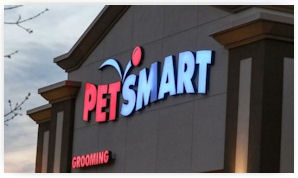 When
Nick Pomilio and his English bulldog Capone watched their boxing matches on TV,
the dog’s snoring eventually would drown out the volume. Pomilio didn’t care. When
Nick Pomilio and his English bulldog Capone watched their boxing matches on TV,
the dog’s snoring eventually would drown out the volume. Pomilio didn’t care.
When they went for walks around their South Philadelphia neighborhood, kids
would ride Capone like he was a horse. Capone didn’t care.
And when the pair visited the barbershop owned by Pomilio’s high school friend,
Capone would waddle in and collapse on the cold tile floor. They would stay for
hours and accomplish nothing. Neither of them cared.
On Feb. 1, 2017, with Capone’s nails starting to curl, Pomilio, 72, a former
mailman, said he took the dog, then about 7, to a PetSmart 2 miles away from his
house.
What in the past had been a 15-minute appointment lasted nearly an hour, he
said. When Capone emerged, Pomilio said, he couldn’t walk and employees loaded
the dog into a shopping cart and wheeled him to the car. Pomilio, shocked, said
he started to drive home but turned around less than five minutes later when he
realized the dog had stopped breathing.
He raced back to the store for help, he said, but it was too late — Capone was
dead.
“I’ll never forget that last look he gave me,” Pomilio said, crying as he
recalled the day in an interview. “You don’t take the dog to get its nails
clipped and it winds up dead as a doornail.”
Scruffles also died after visiting PetSmart. So did Rita, Henry, Pepe, Angel and
dozens more.
An NJ Advance Media investigation documented 47 cases across 14 states since
2008 in which families claim they took their dog to the nation’s leading pet
retailer for a grooming — everything from a nail clipping to a haircut — only to
have it die during or shortly after the visit.
Most cases — 32 in total — occurred after the start of 2015, the same year the
company was bought out by a private equity firm. But those numbers are hardly a
definitive accounting of deaths because very few groomers are required to
publicly report them.
PetSmart, which fiercely defends its safety record, has not admitted wrongdoing
in any of the deaths reviewed by NJ Advance Media.
But the nine-month investigation found deaths during or after groomings at
PetSmart stores — once portrayed by company officials as “entirely separate and
unrelated” anomalies — appear to happen far more frequently than customers and
the general public know.
At the same time, rising awareness already has PetSmart in the crosshairs on
social media. Tens of thousands of people in recent months have organized on
Facebook, and customers have shared their stories and criticized the company.
Prompted by the December death of Scruffles, an English bulldog groomed at a
PetSmart in Flemington, New Jersey, the news organization reviewed lawsuits,
veterinary records and media reports. Reporters also interviewed more than 100
pet owners, current and former PetSmart employees, lawyers, veterinarians,
grooming experts and animal advocates.
Among the findings:
•
English bulldogs and similar breeds known as
brachycephalic dogs, or those with short noses and smushed faces, accounted for
20 of the 47 documented deaths. Those dogs can have trouble breathing,
especially in stressful environments or areas that get hot.
 •
Some former employees allege PetSmart’s groomer
training — which the company touts as the industry’s very best — can fall short
of what’s advertised. They say they have seen unprepared trainees rushed into
stores because of short-staffing, putting dogs at greater risk of injury. •
Some former employees allege PetSmart’s groomer
training — which the company touts as the industry’s very best — can fall short
of what’s advertised. They say they have seen unprepared trainees rushed into
stores because of short-staffing, putting dogs at greater risk of injury.
•
Increasingly, the company is pressuring groomers
to meet sales quotas, the employees said, and many felt either ignored or
retaliated against when they spoke up about safety concerns or wrongdoing by
colleagues.
•
On multiple occasions, PetSmart has offered
out-of-court payments for as little as a few hundred dollars to owners whose
pets die. In return, some owners must sign non-disclosure agreements that
require them to delete social media posts and negative comments.
•
No state requires all individual groomers be
certified, so there’s a lack of transparency of safety records, no enforced
standard training and little public accounting when things go wrong. Causes of
death can be hard to prove, lawyers are hesitant to take cases and, because pets
are considered property, owners can recoup very little money in court. As a
result, exactly how many pets die, and why, remains largely unknown.
“There has to be accountability, but it won’t bring what I miss back. It won’t
bring Capone back and that’s what I want,” said Pomilio, who added that he chose
not to take legal action against PetSmart because he didn’t want to fight a
major corporation. “What can I do? They say they didn’t do anything (wrong).”
On several occasions, NJ Advance Media attempted to discuss its investigation
with representatives of PetSmart. Those attempts began with a formal letter sent
on May 17 laying out the news organization’s findings and 125 specific questions
related to its reporting. The company declined that request and several
follow-up requests for an on-the-record response.
On Sept. 17, three days before publication of this investigation, PetSmart
released a statement that said, in part, “nothing is more important than the
safety of the pets in our care.”
“Any assertion that there is a systemic problem is false and fabricated,” the
statement said. “We extensively investigate any and every incident, no matter
how minor. Our independent team of investigators, many of whom have law
enforcement backgrounds, is committed to conducting these comprehensive
investigations.”
The company declined to disclose the number of deaths it has documented since
2008. In its Code of Ethics and Integrity handbook, PetSmart lists its core
values as doing the right thing, accountability, customer focus, teamwork, rigor
and transparency.
Despite the deaths and growing negative publicity on social media, the company
maintains millions of loyal customers. Sue Conti, 69, of Carteret, New Jersey,
said her 15-year-old Maltese, Gizmo, has been groomed its entire life at the
PetSmart in nearby Woodbridge and she always has been “very pleased.”
Conti said she has heard about the pet deaths.
“He is fine when he comes out, so I don’t worry about it,” she said.
Most of the PetSmart employees contacted by NJ Advance Media declined interviews
because the company forbids speaking with the media. Even those no longer
working for the company often declined because of the close-knit nature of the
grooming community.
The news organization interviewed 22 current or former PetSmart employees, 11 of
whom agreed to be named for this story. The remaining 11 declined to be
identified for reasons including fear of retribution by the company, other
groomers or their current employer.
Cher Harris worked as a groomer at the Deptford, New Jersey, store 10 years ago
and said she never felt a dog was in danger.
“I feel like it’s a witch hunt,” Harris said of the recent news coverage.
“Everyone is looking for the slightest thing. … I feel like they’re out with
their pitchforks trying to take down PetSmart.”
The company appears to share her viewpoint.
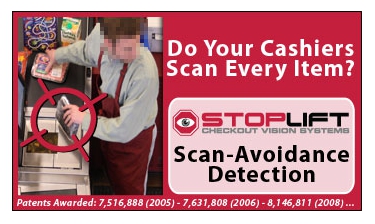
In July, it filed a counterclaim for defamation in a case brought by Danielle
DiNapoli of Lambertville, New Jersey, the owner of Scruffles, who publicized her
dog’s death through the Justice for Scruffles Facebook group.
According to DiNapoli’s lawsuit, the same day she dropped off Scruffles for a
grooming, the 8-year-old bulldog became unresponsive and was pronounced dead
upon arrival at a local animal hospital. DiNapoli alleges in the lawsuit the
death of Scruffles was “intentional and/or reckless.”
PetSmart maintains it was not responsible for the death and employees acted
appropriately. The company said in court records that Scruffles’ death was
caused by “pre-existing medical conditions” but it did not elaborate and noted
DiNapoli had yet to provide documentation of a necropsy, the animal equivalent
of a human autopsy.
During the course of this investigation, PetSmart — which is based in Phoenix
and operates more than 1,600 stores in the U.S., Canada and Puerto Rico,
including 48 in New Jersey — announced several new procedures to “provide pets
with an even safer” grooming experience.
The company said in February it would complete broader assessments of pets at
check-in. PetSmart said it would refuse service if pets show a combination of
lethargy, excessive panting or drooling, trembling or shaking, eye redness or
resistance to entering the grooming or kennel area.
PetSmart also announced that some breeds known to have breathing issues,
including English bulldogs, can only receive express groomings, providing them
uninterrupted service in an effort to minimize stress and risk. The company said
it would install cameras in all grooming areas by August 2019 and hold open
houses and tours at all of its salons on Sept. 23.
(During the course of its investigation, NJ Advance Media visited four stores
and requested tours of the grooming areas but was denied access.)
Finally, PetSmart commissioned an independent review board to assess its
grooming and training standards and provide an “unbiased” report of its
findings, which it said would be completed in the fall. It’s unclear if the
company intends to make the report public.
Not everyone is convinced the changes will make a difference.
Katelyn Douglas said she worked as a PetSmart groomer in North Carolina for 16
months before quitting in April to protest what she called “numerous (pet)
safety violations.”
“PetSmart wasn’t telling us to be more careful,” Douglas said. “They told us, if
a dog is being bad, just take it to the back and smile. They didn’t say, ‘Hey,
everyone needs to be making sure we’re doing this.’ It’s more of, ‘We need to be
sure we look good if someone comes around with a camera phone.’ ”
His sweet angel
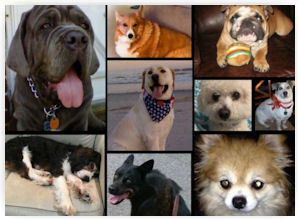 James
Bomford adopted Angel and Katie when they were still fluff balls, maybe a year
or two old, he figures. In 2007, their owner was moving and needed to find a new
home for the golden retrievers. Bomford, 70, a retired NYPD officer living in
Florida, drove 90 miles to pick them up. James
Bomford adopted Angel and Katie when they were still fluff balls, maybe a year
or two old, he figures. In 2007, their owner was moving and needed to find a new
home for the golden retrievers. Bomford, 70, a retired NYPD officer living in
Florida, drove 90 miles to pick them up.
When he returned to Longwood, just north of Orlando, Katie ran through the front
door of his ranch and, within seconds, splashed into his aqua blue in-ground
pool. Angel quickly followed, joining her sister in a happy dog paddle.
It was a sign of a lazy, happy life to come.
Any given sunny day, the two climbed into floating lounge chairs — complete with
cup holders on either side — and drifted around for hours as if shooting a scene
for “Real Housewives of Miami.”
On Feb. 23, 2017, Bomford said, he dropped off Angel and Katie for their regular
grooming at a PetSmart in Altamonte Springs. When he returned several hours
later to pick them up, Bomford said, an employee carried Angel out of the
grooming area “like a sack of potatoes” over his shoulder.
The groomer told him Angel struggled to stand throughout the appointment, and
Bomford was outraged no one called to alert him to the problem, he said.
He took her to an animal emergency room, but she had been bleeding internally
and died.
A necropsy found Angel “most likely” died from a tumor invading a major heart
vein causing the “massive hemorrhage.” That might have been caused by someone
lifting her during a bath, the report said, or the vein may have just burst. It
questioned if “rough handling like trying to make her stand for grooming
(hastened) her demise.”
“Someone should have noted that she was weak and recumbent and should have
obtained help,” the report said, though it noted that may not have saved her
life.
“It’s the basic training of a babysitter: Something happens, you call the
parents,” said Bomford, who hired a lawyer and requested $14,000 in
reimbursement for damages, or changes to PetSmart procedures, including adding a
camera system so owners could watch their pets be groomed. “Instead of calling
me, they proceeded to groom a dog that couldn’t stand.”
He said he has not received a response from PetSmart, which declined to answer
questions about the case.
New ownership
Jim Dougherty and his wife, Janice, co-founded Pacific Coast Distributing in
1986 and opened two stores as PetFood Warehouse in Arizona the following year,
according to a company timeline. In 1989, investors removed the Doughertys and
hired a new CEO, and the company changed its name to PETsMART. That same year,
PETsMART opened its first full-service pet grooming salon.
The company went public in 1993, and, in 2005, it changed its name to PetSmart.
By fiscal year 2014, the final full year it was publicly traded, PetSmart
reported a net profit of $426 million on net sales of $7.1 billion.
It has faced an uphill battle since.
The company is struggling to hold back online retailers, including Amazon, and
pay down $8.1 billion in debt as its sales and margins are shrinking, according
to
an April report by Bloomberg. That comes as Americans spend more than ever
on their pets — $70 billion in 2017, compared with $41 billion in 2007,
according to the American Pet Products Association.
PetSmart employs approximately 55,000 people, according to a company news
release.
Amber Hosford, who was hired in 1999 at the PetSmart in Castleton, Indiana, said
safety practices and training in her store were “very intensive” and “very hands
on” when she began.
“Before you could even touch a dog, you had to take care of a fish,” said
Hosford, who eventually became a trainer and managed a grooming salon. “(Safety
training) was that extensive.”
As time passed, Hosford said, “it turned into how much money we could make and
that’s when the safety practices went to the wayside.”
Hosford, who quit in 2014 as rumors were swirling the company was going to be
sold, said there used to be a motto: “Just one more dog.”
In 2015, PetSmart was acquired by the private equity firm BC Partners for $8.7
billion.
That’s when things changed, said Marti Fernandez, who was a salon manager in two
New Jersey PetSmart stores from 2006 to 2016 and has been a groomer for more
than 40 years. Fernandez said she loved the work until it became more like an
assembly line at McDonald’s.
“When the new owners bought it, they demanded six to eight dogs in eight hours,”
Fernandez said. “This is in addition to walk-in clients, the phones are ringing
off the hook, you’re meeting with pet parents, doing paperwork. … There’s always
pressure to do more dogs.
“It was enough to make me quit,” she said. “I can handle pressure, I can’t
handle their pressure.”
Some employees attributed part of that pressure to sales quotas.
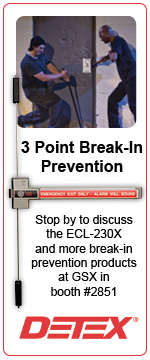
A copy of an April “Associate Performance Report,” obtained by NJ Advance Media
from a store in Washington, tracks the average number of dogs seen by each
groomer per eight hours in one- and four-week periods.
The leading groomer, whose name was highlighted in orange, saw an average of 5.7
dogs per day in the one-week period.
The document also tracks the average amount of money spent on each appointment
and each groomer’s record of selling add-ons — additional services such as a
special shampoo or a teeth cleaning — that drive up the price of a dog’s visit.
While careful tracking of productivity measures and up-selling is common
practice in many businesses, some former PetSmart employees said they’re so
heavily emphasized and publicized among the staff that everything else,
including safety measures, can get overshadowed.
“They say their business is all about the love of pets. Be honest,” said Janette
Parker, who worked for a PetSmart in Jackson, Michigan, as a groomer before
quitting in 2017 to open her own pet salon. “They work for the love of money.”
Decent money, however, was part of the allure of PetSmart for some groomers, who
earn a commission.
Fernandez said she earned anywhere from about $7.50 an hour, before taxes, in
slow times to as much as $25 an hour during peak seasons such as the summer and
around the holidays. She said she was attracted to PetSmart because it offered
paid time off and health benefits. Independent groomers, on the other hand, have
to get their own health insurance.
PetSmart’s base price for grooming a medium-sized dog — which includes a bath
using hypoallergenic shampoo, a nail trim and ear cleaning — is about $34 in
central New Jersey, according to an informal survey of stores. That price
increases to $56 when the customer adds on extra shampoo, conditioner, teeth
brushing and nail grinding.
By comparison, the base grooming at Petco — a bath using shampoo, conditioner,
nail trimming and ear cleaning — costs about $37 for a medium-sized dog. The
standard grooming plus three “spa add-ons” runs about $59.
Independent groomers charge roughly $30 to $50 for a bathing, grooming, ear
cleaning and nail trimming for a medium-sized dog, according to a survey of
central New Jersey grooming salons.
In an interview, Dougherty said he talks regularly with past CEOs and was
generally pleased with how the company was being run, but it was important for
groomers not to take shortcuts.
“You’re taking care of someone’s kid, literally, and you have to treat it that
way,” he said.
“It does break my heart,” Dougherty continued, referring to news reports of
grooming appointments gone bad, but not specifically to PetSmart. “If you do two
grooms a day, you’re in good shape. If you’re doing 200 grooms, you’re going to
have trouble.”
He said later in the interview, “I do think sometimes, unconsciously, profits
are put (above) everything else. Not too sure that isn’t the nature of our way
of life and business. But that doesn’t mean it has to be that way.”
‘Just don’t hurt the dogs’
While largely routine, groomings anywhere can present a number of dangers to
dogs if safety measures are not followed, groomers and veterinarians said. They
include overheating — sometimes the result of drying cages — intense stress and
rough handling.
PetSmart says it has the “highest safety standards in the industry,” boasting a
more than 800-hour bathing and grooming training program. But some former
employees said training can fall short of what’s advertised and be inconsistent,
putting dogs in dangerous situations.
According to PetSmart’s website, trainees first spend three months bathing at
least 125 dogs and learning basic anatomy and techniques. To become a groomer,
bathers then attend “Grooming Academy,” which takes place in designated stores
across the country and includes classes and in-store training for four weeks
(160 hours).
Classroom grads then return to their store for a supervised period of 16 weeks
(640 hours) to groom 200 dogs, according to PetSmart. Finally, they spend the
next six months under continued supervision and evaluation until they become
certified PetSmart Pet Stylists.
In total, the process should take about 14 months.
PetSmart said in a statement that its groomers also complete annual safety
recertifications and participate in quarterly grooming safety training sessions.
Katelyn Douglas, who worked in a North Carolina store, said she felt PetSmart
managers pushed people through the academy as quickly as possible, regardless of
ability, because of short staffing. The training, she said, didn’t live up to
the standards.
“On the first day at academy, there was a dog for me,” Douglas said. “They gave
me clippers and shears and kind of just said, ‘Go for it.’ I was like, ‘Oh, I’ve
never held these before.’ … They said, ‘Well, just don’t hurt the dogs.’”
She said the situation didn’t improve upon returning to her store four weeks
later. She received a training booklet of 200 dogs to groom under the
supervision of her grooming salon manager, she said.
“She wouldn’t even see the dogs I was doing sometimes,” Douglas said. “What if
I’m doing something really, really wrong, but no one’s checking?”
The salon manager could not be reached for comment.
Parker, the former PetSmart groomer in Michigan, said newly trained employees
are scared and pressured to move quickly. What’s more, they can feel stuck
because of the two-year contract they sign with PetSmart to receive academy
training at no out-of-pocket cost.
Groomers could be on the hook for the price of the academy if they leave before
two years, former employees said. In a recent job posting, PetSmart said the
training was “valued at over $6,000.”
In addition, some former employees said they agreed to a non-compete clause,
meaning they could not go work for a competitor for a certain period of time.
Such clauses are typically used to protect a company’s investment in employee
training.
Some former employees also said complaints of broken policies and hostile work
environments fell on deaf ears.
Lisa Cook claims in a lawsuit she was wrongfully fired as a grooming salon
manager at a store in Union Township, New Jersey, in April 2016 as retaliation
for speaking up about employee misconduct. She notified her superior several
times that co-workers were violating safety policies, including hitting a dog
and placing breathing-challenged dogs into drying cages, according to the
lawsuit.
Despite her complaints, the lawsuit said, the practice persisted.
Cook’s superior did not return a call for comment, and PetSmart, which declined
to answer questions about the case, disputed Cook’s allegations in legal
filings. The company and Cook recently resolved the case, but Cook’s attorney
said he could not discuss any details.
In a statement, PetSmart said it encourages employees to “come forward with any
concerns they may have.” The company said problems can be reported to a
confidential and anonymous hotline operated by a third-party provider.
“Our open door policy ensures that associates can report concerns without fear
of possible repercussions,” the statement said. “All reported concerns are
immediately investigated.”
Shrouded in mystery
The death of a pet is traumatic for any family, made worse when it happens
suddenly. Many owners who have lost pets after they were groomed at PetSmart
said they suspected negligence and blamed the store and its groomers.
It’s rarely clear, however, what actually happened.
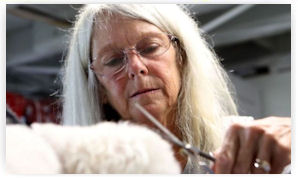 Some
pets could have unknown medical conditions that put them at risk, or they could
die of natural causes, old age or other reasons out of the groomer’s control.
Though PetSmart did not address specific cases in its statement, it said it
considered those issues to be important factors in many of the deaths identified
in this investigation. Some
pets could have unknown medical conditions that put them at risk, or they could
die of natural causes, old age or other reasons out of the groomer’s control.
Though PetSmart did not address specific cases in its statement, it said it
considered those issues to be important factors in many of the deaths identified
in this investigation.
Even when a necropsy is conducted, it is often inconclusive and speculative.
Necropsies cited potential respiratory distress, internal bleeding and heart
disease, but did not pinpoint an exact cause. Necropsies do not list a manner of
death or typically suggest fault, unlike human autopsies, which include a ruling
such as accidental or homicide.
Cases are hard to prove and, since pets are usually legally considered property,
there’s little financial incentive for owners or lawyers.
When cases settle, they result in confidentiality agreements, said Jill Ryther,
an attorney who has represented owners suing PetSmart and is a specialist in
animal rights.
According to a copy of a three-page PetSmart non-disclosure agreement obtained
by NJ Advance Media, signatories are forbidden from revealing anything about an
incident, the payment received or even the existence of the agreement.
PetSmart declined to disclose how many such agreements it has signed related to
groomings. And while it’s typical for a company that agrees to pay money to
demand that the amount remain confidential, PetSmart’s confidentiality
agreements go further, Ryther said.
“To ask that the entire incident not be spoken about and being prohibited to
speak to other people who lost animals, that’s pretty extreme,” she said. “They
basically want to erase that it ever happened. … PetSmart is basically buying
their silence. That’s what they’re paying for.
“It’s like hush money.”
The non-disclosure agreement obtained by NJ Advance Media also says those who
sign are prohibited from discussing their experiences on social media, and
owners confirmed that was part of offers they had received from PetSmart.
Michael Batchelor of North Carolina said PetSmart offered to cover the price of
his $140 vet bill in exchange for signing a non-disclosure agreement and
deleting his viral Facebook post. Batchelor alleges Gunner, his Olde English
Bulldogge, emerged from a PetSmart grooming in January with bloodied eyes due to
hemorrhaging. The company told him it was not responsible for the injury.
He declined the offer. His post about the injury has been shared more than
145,000 times and sparked 46,000 comments.
Tens of thousands of other Facebook users have joined groups created in response
to deaths. The Justice for Scruffles group, which was created after the
bulldog’s death in December, has more than 11,000 followers.
Full of regret
Trinity, a 2-year-old English bulldog, was more than a companion to Thomas
Cunningham.
Cunningham, 35, from Chula Vista, California, said he spent nearly 14 years in
the Navy, but a car crash in 2012 caused severe injuries to his back and legs.
He said he was discharged with a permanent disability and sometimes uses a
wheelchair.
He trained Trinity as a service dog, and she would help him get around,
including nudging his walker and wheelchair closer if he was struggling.
At a park near his home, Trinity played like a child, running herself ragged
with other dogs before crashing in his lap. But usually, after only a few
minutes of rest, a soccer ball would roll by or her pal, a tiny Yorkie, would
come calling and Trinity would burst out of Cunningham’s lap like a cannonball.
Cunningham said he normally bathed Trinity himself, but his disability made it
difficult. One morning in January, after a routine veterinarian checkup, he
decided to take her to a PetSmart in his hometown for a grooming.
“I regret that sometimes,” Cunningham said. “If I didn’t take her, I would still
have her.”
When she emerged from the 11:48 a.m. appointment, she was gasping for air,
Cunningham said.
She died about six hours later, according to a veterinarian’s report. It states
that Trinity suffered from respiratory distress, potentially caused by a
combination of stress, brachycephalic airway syndrome and obesity. The report
shows Trinity was given a nasal vaccination about an hour before the grooming.
PetSmart’s policies require dogs wait 48 hours after vaccination to be groomed.
In its statement, PetSmart did not specifically identify Cunningham’s case or
any others. But it said that, in one instance, a pet owner was advised by a
veterinarian not to take his dog for a grooming on the same day as a
vaccination, and that the owner “concealed the fact that the pet had been
vaccinated.” The company did not say how that might have played a role in the
death.
 Cunningham
disputed PetSmart’s account, saying his veterinarian told him the vaccination
would not affect Trinity because it was the third time she had been given the
spray. He also said PetSmart employees checked that the dog was up to date on
its vaccinations prior to accepting it. Cunningham
disputed PetSmart’s account, saying his veterinarian told him the vaccination
would not affect Trinity because it was the third time she had been given the
spray. He also said PetSmart employees checked that the dog was up to date on
its vaccinations prior to accepting it.
PetSmart declined to answer specific questions about the death. According to
Cunningham, PetSmart told him it had conducted an internal investigation and
found the death was not its fault. When he pressed for answers, the company
instead offered a payoff, he said.
“They offered me $5,000 and wanted to place a gag on me to not talk,” he said,
referring to a non-disclosure agreement. “They said, ‘It’s not our fault but
we’re willing to give you $5,000 because Trinity was a service animal and you
are a disabled vet, and we take care of our vets.’”
He said he rejected the offer.
Pointing fingers
With a lack of independent oversight and little public transparency, it’s nearly
impossible for anyone to know how many pets die during or after a grooming at
any groomer. Both PetSmart and Petco, the second-leading U.S. pet retailer,
declined to disclose how many deaths have occurred at their stores since 2008.
That leaves only anecdotal evidence of problems, and some former PetSmart
groomers said anecdotes don’t tell the whole story.
Trish Carroll, who worked as a groomer and in other capacities from 2003 to 2008
at a PetSmart in Livonia, Michigan, said sometimes pet owners aren’t 100 percent
transparent about their dog’s health because they fear the store will turn them
away. She also said some breeds, like bulldogs, might be better suited for
smaller, quieter and less stressful salons than big operations like PetSmart.
“It’s damned if you do, damned if you don’t,” said Carroll, who still works in
the grooming industry. “How many PetSmart locations are there? How many dogs are
they grooming per day? Of course the numbers are going to look bad. It’s
basically an unfair look simply because they’re large and more people use them.”
But that’s not a satisfactory answer for families who lost their pets.
Two recent lawsuits in California claim PetSmart was aware of a pattern of
serious injuries and deaths but failed to take proper action.
In one case, filed in November 2016, the co-owners of Henry, a 1-year-old
dachshund, sued PetSmart, alleging their dog died after suffering two broken
ribs and a punctured lung at the hands of a groomer at a store in San Mateo.
The case settled for an undisclosed sum and the agreement included a
confidentiality clause.
In September 2017, a woman and her two sons sued PetSmart, alleging a groomer
“killed” their 14-year-old Chihuahua, Arnold, in 2016 at a store in Palm
Springs. The dog did not have a heartbeat when he arrived at an animal hospital,
according to the lawsuit.
The case is pending and PetSmart has denied wrongdoing.
“The number of incidents since 2009 where pets have sustained serious injury or
death while in the care of PetSmart groomers is alarming,” the lawsuit said,
citing 62 reported incidents, ranging from a groomer slapping dogs to at least
seven pet deaths.
PetSmart’s not alone in facing public criticism and pressure to improve its
practices. Petco also has been the target of pet owners.
In 2015, for example, Colby, a 2-year-old golden retriever, died after being
left in a drying cage in Midlothian, Virginia, according to media reports. In
response, the company said it terminated the employees involved and removed the
type of kennel dryer from its stores.
“We take full responsibility for what happened in Midlothian, and remain
heartbroken over Colby’s untimely passing,” the company said in a statement
after the dog’s death. “Pet parents place their trust in us, and we realize that
trust is earned.”
In response to this investigation, Petco said in a statement it had the “highest
standards of animal care and safety in the industry” but acknowledged incidents
and deaths happen.
“Out of the millions of pets we groom each year, the total number of such
incidents make up less than a fraction of a fraction of a percent — many of
which involve pre-existing conditions or circumstances beyond our control — but
even that is unacceptable to us,” the company said.
'Policing needs to be done'
Accountability in the pet grooming industry would take regulation, and some
states have taken steps. A pair of bills introduced in 2014 in the New Jersey
Legislature would assign licensing and oversight to the State Board of
Veterinary Medical Examiners.
But in the four years since, the legislation hasn’t received as much as a
committee hearing. Those bills were reintroduced again this year, and a third
one was also proposed, but they have all stalled.
Similar
bills have been introduced in recent years in other states, including New
York, Rhode Island, Massachusetts and California.
So far,
none has passed.
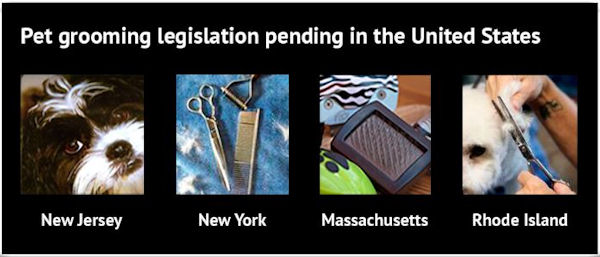
Joey
Villani, a member of the national Pet Industry Joint Advisory Council, which
advocates on behalf of the pet industry, said there’s a recognition that some
policing is needed.
“Groomers are very concerned about the issue,” said Villani, a longtime groomer
and educator based in New Jersey. “We know policing needs to be done … we just
want it done the right way.”
Villani said the industry wants some form of central certification and oversight
by a national organization — such as the Professional Pet Groomers and Stylist
Alliance, which has developed safety standards — as opposed to government
regulation by state licensing boards.
States such as New Jersey already have numerous licensing boards overseeing
everything from barbers and nail stylists to architects and veterinarians. Some
view licensing as necessary oversight, while others see it as expensive and
burdensome, especially on small businesses.
But as the debate continues and legislative proposals languish, experts agree
even a few dog deaths are a blow to consumer confidence in the grooming
industry.
Lyndon Goldsmith, a veterinarian at Central Jersey Veterinary Clinic in Highland
Park, New Jersey, since 1986, said pet deaths during groomings should not be
considered inevitable no matter the volume at a particular store or throughout a
major chain.
“It’s like going to a barbershop, getting a haircut and having your throat
slashed accidentally during a shave,” he said. “No one would say, ‘You know,
well, I do 10,000 shaves a year, three (deaths) is a small fraction.’
“No one would say that. It’s pretty much the same thing.”
Article originally published on
nj.com
|



